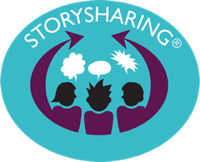We don’t claim that Storysharing® is a programme that can solve every challenge in the world of disability. We have seen how lives can change when people start telling and listening to personal stories together…
Families
Telling stories happens naturally in family settings. We know that families already involve and value relatives with disabilities, and know how to communicate with them! Storysharing® can provide you with another tool in the box….
One of the things that really helped my daughter was Storysharing – it started something for her. I would get excited about it and once she got into the rhythm and had the practice, the language that came from her was extraordinary. She would literally want to share the story when she visited her grandparents, and when she went out. It’s been a blessing and really made a difference to her.
For family members and parent carers we can offer a one off 30 minute free call to talk about how to start with sharing stories, or addressing particular challenges. Contact info@storysharing.org.uk if you would like a chat.
Service providers
Storysharing® can give a voice to those with the most severe disabilities, enabling them to have real conversations with their peers, develop memory and communication, participate in decision making and equalising the balance of power.
‘What impressed me about the storysharing was that it was not discriminatory regards disability; on the contrary, it was very much all-encompassing irrespective of disability and communication barriers.
People with profound learning disabilities may not know how to have a conversation …. but this gives everyone a right to do this …. makes friendships between everyone.’
‘I can’t remember other occasions when service users have willingly sat together – so unusual. It’s really exciting! I wouldn’t have believed it! It surprised me.’
Everything with stories is going to help identity and growth. Once you talk about what has happened you increase their sense of power.
Schools and colleges
Storysharing® fits easily into the curriculum. Through recalling and sharing experiences, home-school links are strengthened; young people take active roles in reviews and school councils; engagement, language and communication skills develop in unexpected ways.
The results have been amazing … with engagement levels increased, use of language, responses, joining in, anticipation and so on.
Speech has improved in the primary age pupils- this has been reported by parents who have noticed improvements at home. There is a pride in sharing with classmates, in the ownership of the story.
Three key pupils went home and told stories to their families and families, they reported it back to the school. They were impressed with the language and use of words.
It was amazing to be able to support one of my pupils to share something with her parents and the head teacher …She was the most confident I have seen her.
Self advocacy and citizenship
Storysharing® strategies enable everyone to have a voice in their local community, sharing the meaning of events in their lives and challenging exclusion and discrimination.
For example, after hearing personal stories co-told between people with profound disabilities and their supporters, a local MP made the decision to vote against a cut in mobility benefits.
The more we can help our young people to tell coherent stories and really say what they want to say then we will achieve that- we will actually get them determining where they want to go and what their future is.
Knowing you’ve been listened to, and understood- that is such a powerful thing, and if you’ve got that then you are going to say something more
By giving them control over small things, it helps with the big decision. The more empowered they are here, the more they will be empowered to take the big decisions in their lives.
